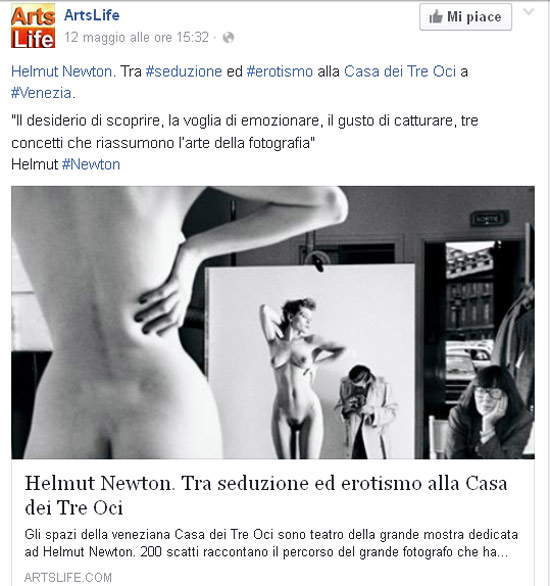It seems that, for some time now, those who want to talk about art on Facebook must take care to be on guard against the increasingly pressing censorship operated by Mark Zuckerberg’s social network. After the cases of the blog Arte a Modino, which had a Facebook ad blocked because the video being promoted included, in the set design, a drawing with a female nude, moreover in the background, and of the Casa dei Tre Oci in Venice persecuted by Facebook for the images of the exhibition on Helmut Newton that will be held until August, this time it was our turn at Finestre Sull’Arte to suffer the heavy repercussions of Facebook prudery.
What happened? Yesterday afternoon, at 4:18 p.m., we shared an article from ArtsLife magazine, which offered just such a review of Helmut Newton’s exhibition at the Casa dei Tre Oci. The preview of the post contained the very famous Self-Portrait with Wife and Models from 1981, perhaps Helmut Newton’s most famous photograph: and since one of the models is completely naked, after a few hours we found a message informing us that the post violated Facebook’s Community Standards. Result? We had to remove the post, and for three days, starting from the notification (which reached us at about 7 p.m. last night), we will not be able to post updates on the Finestre Sull’Arte Facebook page, nor will we be able to use our personal profiles, not even to write in closed groups, or even to send private messages to our friends. In fact, for three days we will only be able to use Facebook for reading: we have been reduced to total silence. But not only that: should other works fall under Facebook’s censorship in the future, the “penalties” will be raised, and we may risk even the deletion of personal pages and accounts. In short, the extent of the damage that the social network’s policy has caused us and our audience is clear.
What’s more, the post we shared from ArtsLife is still present in its original form on the magazine’s page-so we don’t understand how the social network’s managers go about this. We deduce (but it is only our assumption) that someone perhaps reported our content to the social network, and some moderator took action to censor us: and if it had gone that way perhaps the scenario would be even worse, because by the fault of some bigoted and self-righteous user (or, and we really want to hope that this is not the case, by the fault of some user deliberately intent on causing us harm) thousands of people (because such are our numbers on Facebook) are deprived of a tool that every day brings them information about what is happening in Italy in the field of cultural heritage, quality dissemination, news about exhibitions and expositions, opinion articles that open interesting discussions, and much more.
 |
| The post that was censored from us, in the original version on the ArtsLife page |
One then wonders according to what logic Facebook considers a nude offensive to the sensibilities of certain of its users. We read, in fact, in the much-ballyhooed “Facebook Community Standards” (which the social network has repeatedly urged us to read), “The posting of photographs of paintings, sculptures or other art forms depicting nude figures is also permitted.” Since photography is, at least according to common sense, an art form, there are three cases: either Facebook does not consider photography an art form, or its managers are so ignorant that they do not know the figure of Helmut Newton, or Facebook also decides to arbitrarily apply or not apply its own rules, according to logics that completely escape our understanding (as well as common sense).
We believe that censorship of art is completely intolerable. Also because the axe of social this time fell on the work of an artist universally recognized as such. All this while vulgarity, hoaxes, misinformation, scam ads, links that spread viruses, and even content that often amounts to criminal offenses that can be prosecuted: insults, defamation, slander, intimidation, apologia for fascism, discrimination on racial, ethnic, national or religious grounds, and so on, proliferate on pages and bulletin boards. In short: if art is not free to express itself on Facebook, it means that the social network needs to start asking itself some questions. Beginning by asking whether the alleged offense to public decorum is really inherent in the work of art, or is it rather an invention of those who, dressing in the inappropriate role of censor of artistic nudity, consider the work offensive. We will always try, as much as possible, to fight so that Facebook can become a place where all forms of art can truly express themselves without having to constantly question the conformity of content with the moralism of the social and many of its users. Because the idea of censoring art is wrong, retrograde, anachronistic, obtuse, stupid and offensive to common intelligence.
Warning: the translation into English of the original Italian article was created using automatic tools. We undertake to review all articles, but we do not guarantee the total absence of inaccuracies in the translation due to the program. You can find the original by clicking on the ITA button. If you find any mistake,please contact us.